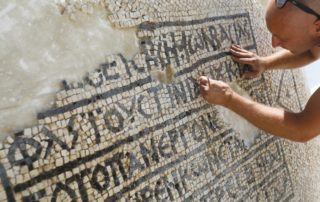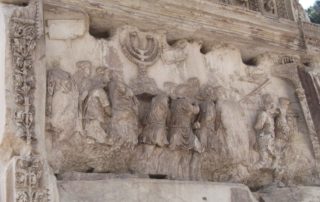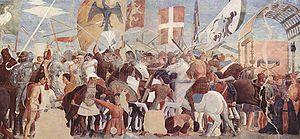Classical History of Jerusalem
Hellenizing Jerusalem
In 333 BC, after 200 years of Persian rule in the holy city, Jerusalem was conquered by the Greeks under the leadership of the Macedonian emperor Alexander the Great, who was able to take over Egypt and Levant.[1] After his death, the Greek Empire split into two factions: the Ptolemies of Egypt, and Greeks of Syria known as Seleucids. For more than two centuries the [...]
Rome and an Era of Rebellions in Jerusalem
Seventy years after Antiochus Sidetes, King of Seleucids, besieged Jerusalem in 134 BC, Roman Commander Pompey succeeded in capturing the city in 63 BC,[1] and for seven centuries (63 BC-638 AD) Jerusalem was ruled by the Romans.[2] Although Pompey destroyed the walls and many buildings in Jerusalem when he entered it,[3]the Romans otherwise led a civilized invasion of the city[4] and for two centuries [...]
The Messiah and the Holy City
After the death of Herod the Great and from 4BC-41 AD, Jerusalem was ruled by Roman officials called procurators.[1] it was under the rule of procurators that Jesus was born. Jesus was born in Bethlehem, raised in Nazareth and Galilee, and preached in Jerusalem.[2] According to the Christian tradition, crucified and buried in the city as well.[3] The bible mentions that Jesus visited the [...]
A New City, A New Era (Aelia Capitolina)
In 130 AD, when the Roman Emperor Hadrian visited Jerusalem, He decided against reconstructing the city for the Jewish people and treating it as a roman colony instead..,[1] Following this decision, Christians were persecuted, the Jewish temple was replaced with a Roman one and practice of Judaism was banned under the penalty of death. This approach led to the second Jewish revolt against Romans.[2] [...]
The Christian Kingdom of Byzantium
During the first five centuries after the quelling of the second Jewish revolt, peace prevailed in the holy city of Jerusalem[1] and from 324 AD- 638 AD Christianity was the official religion of the empire.[2] In 330 AD, Emperor Constantine’s rule extended from the Roman Empire to the Byzantine Empire, and shortly after Christianity became the dominant religion of the Empire upon his conversion to [...]






